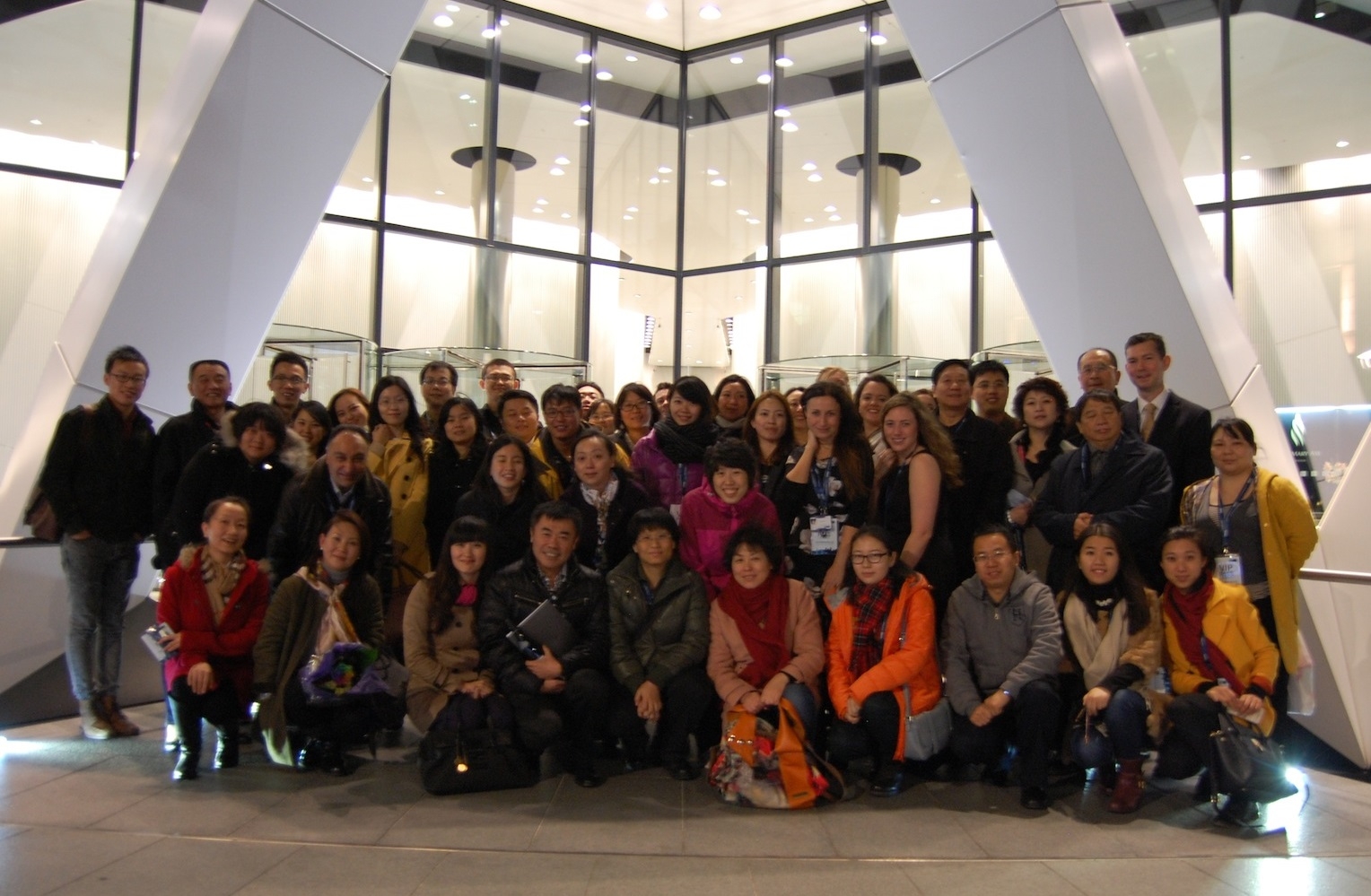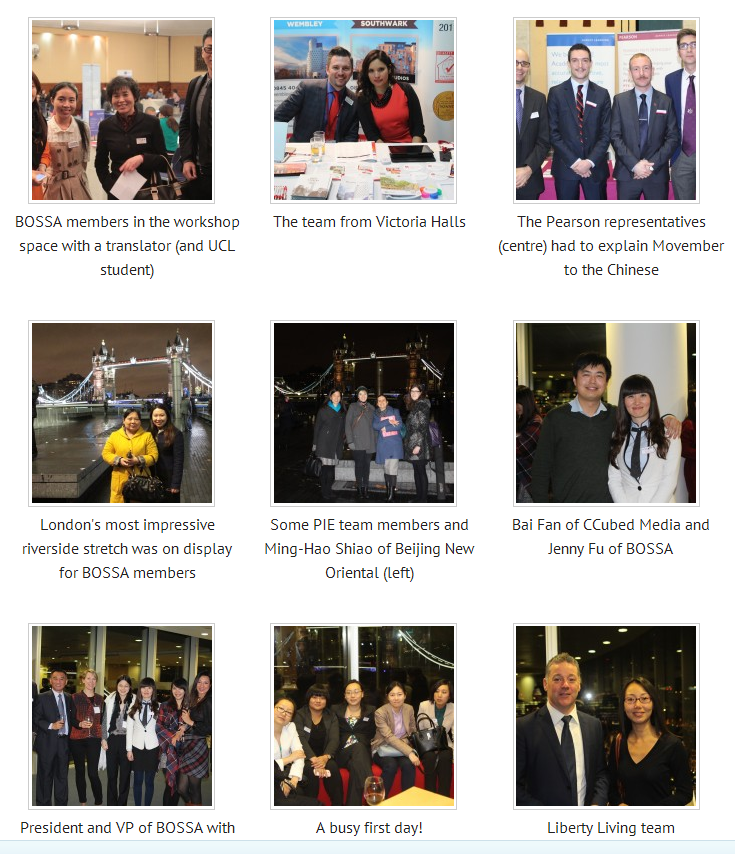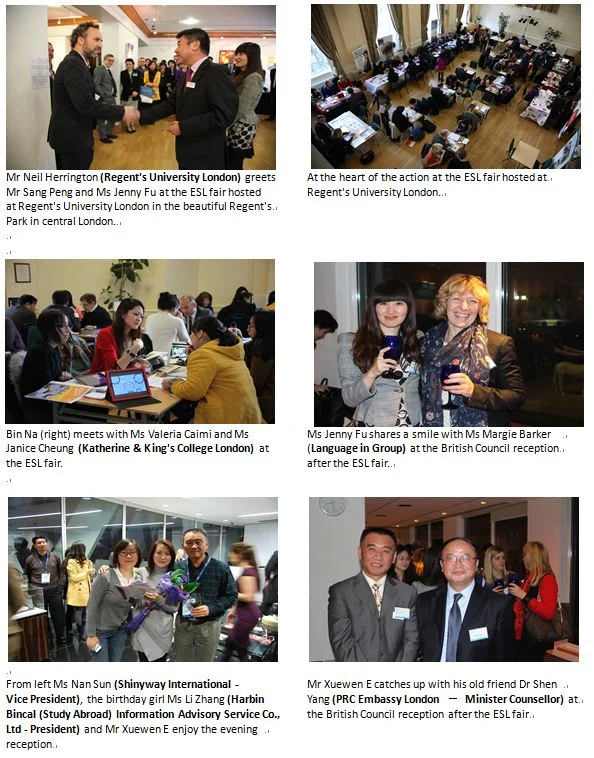Latest Interviews & Blogs
"Chinese study abroad trends and more, Q&A with Mr. Shuai Yang, Senior Director at BOSSA
" Marketing Digitally to Chinese students" by BOSSA
"China releases outward facing international education strategy to 2020" Interviewed: Beijing Overseas Study Service Association (BOSSA) President Mr. Sang Peng
"UK's new 24-hour visa for Chinese students...will it make a difference?" Interviewed: Chinese Study Abroad Agents of BOSSA
"Do Chinese agencies pay their local government taxes on commissions they receive from overseas schools? Interviewed: Agency General Manager, BOSSA President
"Institutional Partnerships in China" Interviewed: BOSSA Chief Consultant
"What's wrong with summer study programs" Interviewed: BOSSA President
"Beijing's New Policy on Internships for International Students" Interviewed: BOSSA Communications Director
Chinese study abroad trends and more, Q&A with Mr Shuai Yang, Senior Director of BOSSA
Q. What are some of the current trends for Chinese students? Has this changed in the past two years?
(1) The age group of students going abroad is continuing to go down, averaging around 16 year olds, or the graduates of junior high schools. The trend has appeared for some years and we believe it will continue to grow for sometime.
(2) An increasing number of students and parents in Tier 1 and 2 cities (Beijing, Shanghai, Guangzhou, Hangzhou, etc) have realized the significance and favorability of the transfer pathway for study in the USA: spend two years at community colleges and transfer to reputable universities afterwards. However, the majority of students are still strongly pushing agencies to help them enroll straight into those same universities - ignoring or unaware of the community college track. We believe community colleges have lots of untapped opportunity.
Q. Has there been much change in the Chinese agency sector since licensing requirements were cancelled by China’s State Council?
Most agencies who didn’t obtain the license are pleased with the new policy. However, after becoming “legal” (registered businesses) agencies, they then highly want to be recognized by the industry, so many of them are applying for memberships with BOSSA and COSSA. In the past 6 months, the number of our overall members in COSSA has more than doubled.
Q. Does the cancellation of licensing requirements for Chinese study abroad agencies make BOSSA even more relevant now in terms of ensuring quality control?
Quality control has been one of the major goals of BOSSA. Since we formed almost 13 years ago, QC recently has now become our most important goal since the new policy was issued. One of the ways to control the quality of service is to improve the quality of people working in the industry. A few years ago, BOSSA established the first and the only system of employee tests of the agency industry – China Education Agent Certification, and has issued hundreds of certificates, with over a thousand agents enrolled in training, to agents working for BOSSA member agencies. The training system is still rather preliminary at this stage, but will be more mature by the end of 2017, when the three category system will be roughly completed. The total number of agents in China is estimated to be between 20,000 to 30,000. BOSSA is aiming at more than half of them be enrolled in the training system in three to five years.
Q. What does BOSSA have planned for the rest of 2017 and beyond?
(1) Complete or nearly complete the CEAC training system.
(2) Marketing of the project of Chinese education document verification services (in cooperation with the Ministry of Education)
(3) A number of Chinese regional conferences/expo of BOSSA and COSSA.
(4) One or two delegations of member agencies to north America or Europe.
(5) A new training project for senior management of member agencies – BOSSA business school.
Marketing Digitally to Chinese Students
Social Media
A social media presence is a must for anyone looking to recruit Chinese students. Forget Google, Facebook and Youtube, (they're blocked). With 1.1 billion accounts and 549 million monthly active users, WeChat is the largest social network in China. And over half of users opening it more than 10 times a day it is a more effective way to communicate than email.
“The Chinese digital space has its own platforms, behavioral patterns, search engines, indexing and algorithms or rules for domain registration,” comments Samuel Vetrak, CEO of StudentMarketing. “It is a unique universe, different from the ones seen in other countries. One needs to be registered behind the firewall, know and adapt to local platforms and preferences, in order to succeed there.”
WeChat is also commonplace in business interactions often preferred over email communications. Don’t forget to use the app to scan your partners’ QR code after a meeting to stay in touch.
Educators should create verified WeChat accounts and post information that is easily digestible, shareable and mobile friendly. Publish articles about accommodation, careers of students and alumni, programmes and course information.
Video
Creative audiovisual content and quality photos and videos go a long way in catching their attention.
To just tell students the entry requirements is kind of boring, so you have to make it fun and simple. Well produced video interviews with current Chinese students explaining how they find the campus, city and university are also very popular.
Chinese students want to see other Chinese students. “It is important to provide information and materials about the school and surrounding area. The content has to include information about student life and safety, shopping, restaurants, museums and activities near the school besides the information about the services available to overseas students.”
China releases outward facing international education strategy to 2020
Interview with Beijing Overseas Study Service Association (BOSSA) President Mr. Sang Peng
Mr. Sang, what are your thoughts on the latest government education guidelines?
The most recent publication released by the Department Of Education, as with previous releases expresses a positive and increased focus on education policy and reform. Unfortunately there is no direct reference to the topic of self-funded overseas study and no definite thoughts on future policy or direction.
There are approximately 20,000 government funded overseas students sent abroad each year. In striking contrast, the amount of self-funded overseas students is close to 500,000 every year. The amount of government funded students pales in comparison, but the latest guideline release by the education department gave little or no reference to this massive component of the overseas study industry.
In the past ten years, the education department has given little support and policy guidance to the overseas study industry. As an overseas study service association, we seem to be taking on the sole responsibility and burden for the development and standardization of this ever growing industry in China. We directly support our agents and strive for a better customer service orientated industry.
Through the CEAC Agent Training and skill development course, we hope to increase the professionalism, sincerity and level of service provided to Chinese students wishing to study abroad.
Source: http://news.xinhuanet.com/politics/2016-04/29/c_1118775049.htm
U.K's new 24 Hour "Priority Service" Visa is exclusively for Chinese students, but will it make a difference?
Interviews with BOSSA study abroad agents; answer:
- Do you think this fast 24 hour visa service could help Chinese agencies?
- Could this be a popular option for Chinese students?
- On the other hand, do you think 750 Pounds is too expensive? Could this discourage Chinese clients?
Interviewed: Beijing Youjia Future of education Consulting Co., Ltd. co-founder & Beijing Century Licai Education Advisory Co., Ltd. (the world study center), General Manager: Song Feng Liang
Super special privileges, 24 hours for accepting intermediaries in terms of not much help for students and parents in terms of cost or expensive, only under very tight time possible selection in the choice of the general: students will not choose. Now the UK launch of the student visa expedited
Should pay more for that service more than 1,200 yuan, the majority of students will not choose, but also because of the visa fee is very expensive.
Interviewed: Oxford Education Group, Channel Manager: Ms. Xu Jingjing
Chinese students generally learn to study in the UK began to apply three months in advance, there is plenty of time to apply for the visa and the submissions before the study and preparation. The British university enrollment dates will be given the deferment of service based on international student enrollment. Chinese intermediaries are very professional, they will do their best in front of the school will complete all procedures and processes to handle, smooth to ensure that students arrive in the UK before the start date and the smooth enrollment. Except in special circumstances, it is possible to use the expedited service. For example, the UK schools often only a deferred access to education, if you have the opportunity in the deferment of missed the start date, and it will only miss the return to China.
She declined to speak in capacity as the representative of the organization: If the Government wants to increase education economic support, there is no need to add money to the visa fee.
Interviewed: Studying Abroad Live app, Vice President; Operations: Yang Huan
Dealing with emergency case, it can still help to agencies, after all, to get a visa as soon as possible, follow relatively trivial things controllable; it should not become a popular option, after 3-5 days the visa will add more than RMB1200; RMB7500 indeed too expensive; if you can adjust to RMB 3000 + would be more able to be accepted.
Interviewed: Kent University, China Office: Wei Hongliang
The Super Priority is ideal for Express UK student visa, the student body will recommend urgent need of such help when the it is Super Priority and therefore provides a good mechanism to help students cope with demand; in general not in a hurry to get a visa students may not choose such a visa service, the main reason is that some high visa fees, but students needed in terms of the level of visa fees is not a problem.
Do Chinese agencies pay their local government taxes on commissions they receive from overseas schools?
Interviews with BOSSA staff, representatives of its study abroad agency members and partnered institutions
Interviewed: An agency general manager
According to the British tax system, if it is relevant to UK individuals or companies registered in the United Kingdom, in accordance with the level of income should pay the corresponding taxes. But if the company is not registered in the United Kingdom, I believe that this tax should not be paid by the agency. This matter should be seen in two ways:
1. Chinese intermediaries or educational institutions registered in the UK should implement the principles of local legal taxation.
2. If only China and overseas institutions the agency signed a partnership agreement enrollment agent, then the tax commission should be something between overseas institutions and the seat of government. It's part of the obligation of local financial institutions abroad, and cooperation unrelated party.
Interviewed: Beijing Overseas Service Industry Association (BOSSA) President Mr. Sang Peng
1. Generally speaking, if the legitimate Chinese agency established local offices abroad, overseas and establish cooperation with a university or local partner organizations signed a distribution agreement enrollment, will also be in accordance with local laws and regulations, and signed agreements with overseas universities in the agreement, in accordance with normal legal procedures and reasonable taxes. This commission is usually paid for by taxes or local universities/overseas partner institutions to the local tax bureau, or by the Chinese agency to pay the taxes in the local (China) tax office, in accordance with the prior agreement of the two sides implemented.
2. Some Chinese intermediaries do not set up overseas offices, but only with overseas universities or educational institutions to cooperate, and that on this tax in the usual sense, it is local or overseas university educational institutions in accordance with local tax laws and conventions and the payment of commission to the tax agency in China.
3. However, in order to establish the identity of a natural person and the university or educational institutions, and the case of commission, not in Beijing Overseas Service Industry Association (BOSSA) the scope of supervision, which we can not quite understand the true situation and details.
Institutional Partnerships in China
Q&A Policy Guide on 3+1 and 2+2 arrangements with Chinese universities.
Shuai Yang, Senior Consultant at BOSSA
For foreign institutions wanting to partner with Chinese schools, they must submit applications to the national/state ministries of education to get approval. Is that true?
There are basically two types of N+N programs in terms of government approval:
1. Programs with the national (MOE) approval may join all public universities recruiting students from high school graduates throughout the country. These students are called "in-quota students", because they have passed the nationally unified entrance exam to universities. It is fairly easy to have the number of students the programs expect.
2. Programs without the approval can't recruit in-quota students. They have to recruit either "out-of-quota" students (who failed the national exam) or students from the current student body of the Chinese partner universities, namely, transfer the students from their Chinese programs to the N+N programs. It is not easy and usually the number of students is small.
The second type may not have any government approval at all, but many universities would apply for provincial approval or "file" the program with provincial governments.
How difficult is it to get approval for such an arrangement from the national and provincial governments of China?
MOE approval is very difficult. The approval criteria is that the foreign partner university has to be a very good one, if not the best in its country, and the subject of the N+N program has to be in the academic area where there are not many Chinese universities providing similar programs. Generally speaking, science and engineering programs are more possible to get the approval than business programs. MOE officials have been saying in unofficial occasion that they will not approve any business programs in the future, "There are already too many of them in China."
But provincial approval is much easier. Local universities can usually get it. In some cases recently, some universities are recruiting in-quota students from outside the universities for its N+N programs with provincial approval. MOE would punish the provincial educational authorities and the universities in the past, but they look safe now. Don't know why.
What are the criteria to qualify as a top US university, program, or faculty to be considered a viable partner?
The MOE people read the US News & World Report and trust its college ranking. Many Chinese universities have already got N+N programs on their campuses and would like more. Those who don't have any N+N yet are usually small local universities, and for sure they want to have it.
Find a partner university or a couple of partner universities in China who really want to have programs with foreign universities (you'd better have strong promise from the president of Chinese partner university) and push them for approval, whatever the approval is, be it MOE or provincial. For example, Tianjin municipality is considered on the same level of provincial government.
What's Wrong with Summer Study Programs
Sang Peng, President of BOSSA
The number of students using their holiday break to study abroad is on the increase. The number of students participating in summer or winter study programs has increased from 230,000 in 2013 to 300,000 in 2014, an increase of 30-40%.
According to statistics sourced from Baidu Search Engine, the number of comments regarding holiday study student figures reached 2,120,000 within a one month period. This is an overall increase of 11%. The above mentioned figures show that the number of people wishing to undertake in holiday study programs is enormous and will increase in the coming years.
The current problem is there are too many people conducting these programs and there is no real organization. Secondly, the format of these programs seems to be all the same i.e. half day language study/half day outside activities.
There is limited variety in program structure. These may not help students improve their language level or deeper understand the local culture. Thirdly, there is no regulation on pricing. More often than not the fees are too high, sometimes higher than regular holiday tours of similar content.
For a long period the Chinese government has paid little attention to the development of this industry. This has led to the current situation.
The Guide for Study Abroad Programs of Primary and Secondary School Students issued by the Ministry of Education in July 2014 shows that the Chinese Education Department is starting to pay attention to the holiday study industry. This is good news.
Having this new material is much better than having nothing at all. However, The Guide only really represents the government’s attitude, and only shows that the government is participating in the discussion. With no real enforcement and implementation of the content it is difficult to regulate the holiday study industry. In reality this approach will not solve the problem. The biggest problem concerning holiday study programs is enforcing regulations upon those running these programs.
BOSSA members are all overseas study service organizations which are jointly supervised by BOSSA and the Chinese government. Any guidance or suggestions made by the government will directly influence their operations. In reality The Guide will have a limited influence on BOSSA members. As far as I know the requirements for BOSSA members to adhere to the provisions outlined in The Guide are minimal. Our members are already meeting these requirements and in some cases do more than is required of them.
Beijing's New Policy on Internships for International Students
Jon Santangelo, BOSSA Communications Director
I know you’re focused mostly on outbound mobility from China but I’m reaching out to see if maybe you could provide insight/comment on the new policy set to begin March 1 facilitating internships, work/study, entrepreneurship for international students in Beijing’s silicon valley. Source: http://english.gov.cn/state_council/ministries/2016/01/13/content_281475271173420.htm
Until now, have there been challenges in place international students into internships in China?
Absolutely. Let me first preface; I recruited foreigners for jobs and internships, for two years (between 2012-2014), prior to joining BOSSA. Actually I first came to Beijing on a management traineeship with Hilton hotels in late 2009 through an international exchange organization, AIESEC, the worlds largest student lead nonprofit organization. Back then obtaining a work (Z) visa was easier and I was fortunate to qualify for one prior to my internship.
But now, scarcity has increased due to English speaking overseas returnees (slang: sea turtles) and tighter restrictions for foreigner working visas. Over the last few years, authorities have enforced Z-visa employment working minimum requirements of: a bachelors degree, 2 years of work experience outside of China- after graduation, a criminal background check, health exam, and the business license from the China based employer and their permit to hire foreigners. Most international students don't have two years of working experience after they graduate and some local companies are apprehensive to bring on foreigners as interns.
However this new policy should be positively received and will hopefully encourage international students to embark on internships, alongside easing the hiring process for employers.
Before the regulation changes and the introduction of the M Visa, most foreigners doing an internship were on an F business trip visa or on a tourist visa. F visas were generally safe, but working under tourist visas were not. It was a high risk on the foreigners' part to work or do an internship on a tourist visa. Punishment was in fines and possible deportation.
The biggest challenge for most interns was renewing their F visa every several months by exiting and re-entering the country, or hiring an agent to help renew the visa. Some local companies aren't familiar with the renewal process. Often times, foreign interns had to travel abroad, alone (commonly to Hong Kong) to renew a visa.
(Part of my former job as a consultant was advising local companies on how to handle HR aspects of foreign staff).
Fortunately the newly enforced visa, M, is specifically for internships and has a set (start to end) validation period.
Another challenge is the cost of third party internship placement programs, which can range from 1-3,000USD, not including airfare and leisure expenses. Some international students (and parents) can't justify paying an exorbitant amount for an internship, but DIY options can be scarce or confusing. Many employers don't advertise their internship positions and welcome third party agencies to outsource recruitment. However expat websites with social media accounts on WeChat do feature quality employment opportunities consistently.
Is Beijing different from other parts of the country in terms of policy around internships/work study for foreign students?
Not sure, but most jobs are in either Beijing or Shanghai, in companies whom have a permit to hire foreigners. It's less common to work in second or third tier cities. It is legal to intern/ work study under a particular student visa issued by the host university. This has helped some foreign students. Zhonguancan is the Silicon Valley of China whereas tech companies value international talent whom posses IT skills.
Is staying in the country to work or start a business after graduation a main driver for students studying in China? Do you think this could increase student interest in studying China?
Most students come to learn Chinese language and culture with aspirations of doing business or relations work with China from their home countries. Few seek work or internships thereafter and often return home upon completing studies.
Another phenomenon are Chinese students who return from studying abroad: Whom the more common type to start their own business in China. A majority of foreigners doing entrepreneurial endeavors in China are mature, experienced professionals. But hopefully these new policies will help spark more demand in studying, and staying, in China. There are still valid opportunities to explore. Personally, many friends of mine started off in Beijing as interns years ago and stayed, eventually becoming working professionals.









